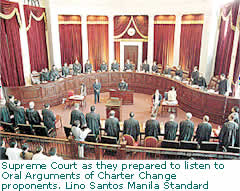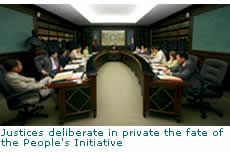The close eight to seven vote highlighted the strong arguments on both sides of the issue and helped buoy the spirits of the losing camp who will file a motion for reconsideration. But even as Sigaw Ng Bayan and ULAP ask the court to reconsider, the strategy of Charter Change proponents has shifted to "Plan B." This is where congress convenes as a Constituent Assembly and changes the constitution to create a unicameral, parliamentary form of government.
The vast majority of senators, are naturally opposed to charter change and the shift to a parliamentary form of government as this would mean the abolition of the Senate. As one local pundit put it: "expect the senators to fight tooth and nail to save their sorry behinds." But the groundswell of change for scrapping the current form of government grows stronger with each passing day. Admittedly, there are a few Filipinos who still believe that an American-style bi-cameral system should work in the Philippines...well, it hasn't! Both the process and the people different. What we need is a form of government that works best for the Filipino people, not just a "copy-cat" facsimile of the American model.
Click on
this link
to send us your comments:
Click on this
link to
view comments:
|



